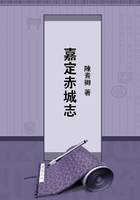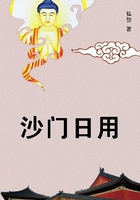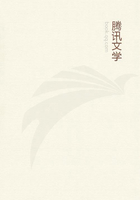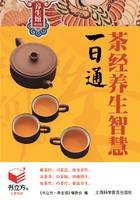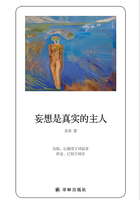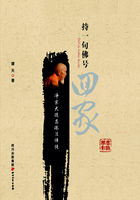Johnson was not grave, however, because he knew not how to be merry. No man loved laughing better, and his vein of humour was rich and apparently inexhaustible; though Dr. Goldsmith said once to him, "We should change companions oftener, we exhaust one another, and shall soon be both of us worn out." Poor Goldsmith was to him, indeed, like the earthen pot to the iron one in Fontaine's fables; it had been better for HIM, perhaps, that they had changed companions oftener; yet no experience of his antagonist's strength hindered him from continuing the contest. He used to remind me always of that verse in Berni--"I pover uomo che non sen' era accorto, Andava combattendo--ed era morto."Mr. Johnson made him a comical answer one day, when seeming to repine at the success of Beattie's "Essay on Truth"--"Here's such a stir," said he, "about a fellow that has written one book, and I have written many." "Ah, Doctor," says his friend, "there go two-and-forty sixpences, you know, to one guinea."They had spent an evening with Eaton Graham, too, I remember hearing it was at some tavern; his heart was open, and he began inviting away; told what he could do to make his college agreeable, and begged the visit might not be delayed. Goldsmith thanked him, and proposed setting out with Mr.
Johnson for Buckinghamshire in a fortnight. "Nay, hold, Dr. MINOR," says the other, "I did not invite you."Many such mortifications arose in the course of their intimacy, to be sure, but few more laughable than when the newspapers had tacked them together as the pedant and his flatterer in Love's Labour's Lost. Dr. Goldsmith came to his friend, fretting and foaming, and vowing vengeance against the printer, etc., till Mr. Johnson, tired of the bustle, and desirous to think of something else, cried out at last, "Why, what would'st thou have, dear Doctor! who the plague is hurt with all this nonsense? and how is a man the worse, I wonder, in his health, purse, or character, for being called Holofernes?" "I do not know," replies the other, "how you may relish being called Holofernes, but I do not like at least to play Goodman Dull."Dr. Johnson was indeed famous for disregarding public abuse. When the people criticised and answered his pamphlets, papers, etc., "Why, now, these fellows are only advertising my book," he would say; "it is surely better a man should be abused than forgotten." When Churchill nettled him, however, it is certain he felt the sting, or that poet's works would hardly have been left out of the edition. Of that, however, I have no right to decide; the booksellers, perhaps, did not put Churchill on their list. I know Mr. Johnson was exceedingly zealous to declare how very little he had to do with the selection. Churchill's works, too, might possibly be rejected by him upon a higher principle; the highest, indeed, if he was inspired by the same laudable motive which made him reject every authority for a word in his dictionary that could only be gleaned from writers dangerous to religion or morality. "I would not," said he, "send people to look for words in a book, that by such a casual seizure of the mind might chance to mislead it for ever." In consequence of this delicacy, Mrs.
Montague once observed, "That were an angel to give the imprimatur, Dr.
Johnson's works were among those very few which would not be lessened by a line." That such praise from such a lady should delight him, is not strange; insensibility in a case like that must have been the result alone of arrogance acting on stupidity. Mr. Johnson had indeed no dislike to the commendations which he knew he deserved. "What signifies protesting so against flattery!" would he cry; "when a person speaks well of one, it must be either true or false, you know; if true, let us rejoice in his good opinion; if he lies, it is a proof at least that he loves more to please me than to sit silent when he need say nothing."That natural roughness of his manner so often mentioned would, notwithstanding the regularity of his notions, burst through them all from time to time; and he once bade a very celebrated lady, who praised him with too much zeal, perhaps, or perhaps too strong an emphasis (which always offended him), "Consider what her flattery was worth before she choked HIMwith it." A few more winters passed in the talking world showed him the value of that friend's commendations, however; and he was very sorry for the disgusting speech he made her.
I used to think Mr. Johnson's determined preference of a cold, monotonous talker over an emphatical and violent one would make him quite a favourite among the men of ton, whose insensibility, or affectation of perpetual calmness, certainly did not give to him the offence it does to many. He loved "conversation without effort," he said; and the encomiums I have heard him so often pronounce on the manners of Topham Beaucler in society constantly ended in that peculiar praise, that "it was without EFFORT."We were talking of Richardson, who wrote "Clarissa." "You think I love flattery," says Dr. Johnson, "and so I do; but a little too much always disgusts me. That fellow Richardson, on the contrary, could not be contented to sail quietly down the stream of reputation without longing to taste the froth from every stroke of the oar."With regard to slight insults from newspaper abuse, I have already declared his notions. "They sting one," says he, "but as a fly stings a horse; and the eagle will not catch flies." He once told me, however, that Cummyns, the famous Quaker, whose friendship he valued very highly, fell a sacrifice to their insults, having declared on his death-bed to Dr. Johnson that the pain of an anonymous letter, written in some of the common prints of the day, fastened on his heart, and threw him into the slow fever of which he died.

